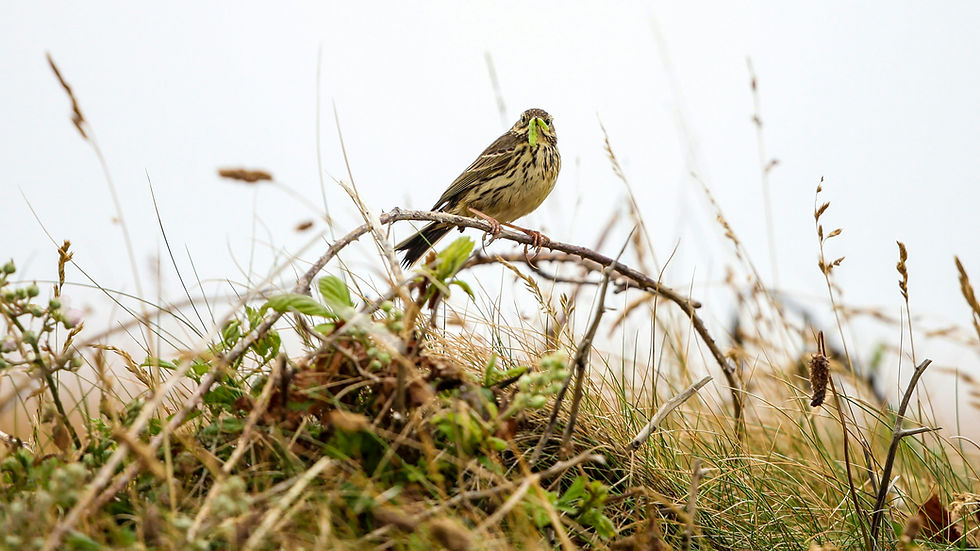The Importance of Bees and Biodiversity: A Call to Action
- trovegreenprovisio
- May 18, 2025
- 3 min read
Updated: Jul 11, 2025
Why Bees Matter More Than You Think
Bees are among the most important pollinators on our planet. About one-third of the food we eat—from apples to almonds—depends on pollinators like bees. However, their contributions go far beyond what we place on our dinner plates.
By pollinating plants, bees play a crucial role in maintaining the health of entire ecosystems. These plants, in return, support other wildlife, produce oxygen, and prevent erosion. In short, bees are a keystone species. When they thrive, the rest of the ecosystem flourishes too.
It’s not just honeybees that matter. There are over 20,000 species of bees worldwide, many of which are wild, solitary pollinators critical to local ecosystems.
Declining Populations
Sadly, pollinator populations are on the decline. This decline is due to habitat loss, harmful farming practices, changing weather patterns, and excessive pesticide use. Air pollution also negatively affects bees. Preliminary research indicates that air pollutants interfere with the scent molecules plants release. These scents are vital for bees to locate their food. The mixed signals make foraging less efficient for bees, hampering their effectiveness in pollination. The answer to protecting pollinators lies in increasing biodiversity!
The Bigger Picture: What Biodiversity Really Means

Biodiversity refers to the variety of life on Earth. It encompasses every species of plant, animal, fungus, and microbe, along with the ecosystems they create. Protecting biodiversity is not just about saving iconic creatures like polar bears or preserving tropical rainforests—it is fundamentally about our survival.
Why Biodiversity Matters
Healthy Ecosystems: Diverse ecosystems are more productive, stable, and resilient. When multiple species interact, they provide essential services like pollinating crops, purifying water, breaking down waste, and maintaining soil fertility.
Climate Resilience: Biodiverse forests, wetlands, and oceans can absorb and store vast amounts of carbon. They also protect against floods, droughts, and extreme weather by regulating temperature and water cycles.
Human Health: Many modern medicines originate from nature. For instance, willow bark provides aspirin, fungi yield penicillin, and various rainforest plants are utilized in cancer treatments. Losing biodiversity means potentially losing these cures.
Food Security: A range of species ensures that our crops and livestock can adapt to pests, diseases, and changing climates. Monocultures are far more susceptible to collapse.

When biodiversity diminishes, the systems on which we depend weaken, become less efficient, and are more prone to breakdown. Pollinators, like bees, often bear the brunt of this stress.
What You Can Do to Help (and It’s Easier Than You Think)
You don’t need a farm or a forest to make a significant difference. Here are six simple ways you can support bees and biodiversity, starting today:
1. Plant a Pollinator Garden
Where to Get Plants:
Visit Mahoney’s Garden Center in Winchester for native flowering plants like purple coneflower, milkweed, and bee balm.
Check out local events by the Mass Pollinator Network for plant sales and seed swaps.
🌱 What to Plant in Medford 🌱
Native favorites include goldenrod, New England aster, and black-eyed Susan. These plants thrive locally and attract bees and butterflies.
2. Skip the Pesticides
Avoid using lawn chemicals or “weed and feed” products that harm bees and runoff into the Mystic River. Choose organic alternatives or let your lawn go a little wild. Clover and dandelions are early food sources for pollinators.
3. Support Organic & Regenerative Farming
Shop Locally:
Visit the Medford Farmers Market (Thursdays, June–October) at the Condon Shell for organic produce and local honey.
Look for vendors like Silverwood Organic Farm and Stillman’s Farm, which use pollinator-friendly practices.

4. Buy Local Honey and Bee-Friendly Products
Where to Find It:
Buying local supports regional beekeepers and helps maintain healthy hives close to home.
Check out Boston Honey Company for local honey options.
5. Create a Bee Hotel or Wild Yard Space

Leave a patch of bare soil or build a bee hotel using hollow stems or drilled logs. There are many guides available through Mass Audubon.
Even smaller yards in Medford can provide crucial habitats. Consider avoiding mowing parts of your lawn during “No Mow May.”
6. Raise Your Voice for Biodiversity
Get Involved Locally:
Join or follow the Medford Conservation Commission or the Friends of the Fells to support local preservation efforts.
Support initiatives like Trees Medford to expand the city’s urban canopy.
Raise awareness among children and youth about the importance of bees. Show your support for local beekeepers.
The fate of bees and biodiversity may seem like a big, global issue, but it is also deeply personal. Every flower you plant, every plastic-free choice you make, and every patch of green space you protect—it all adds up.
This May, let’s honor the small creatures that hold our ecosystems together. By protecting bees, we protect biodiversity. And when we safeguard biodiversity, we ensure our own survival.
.png)















Comments